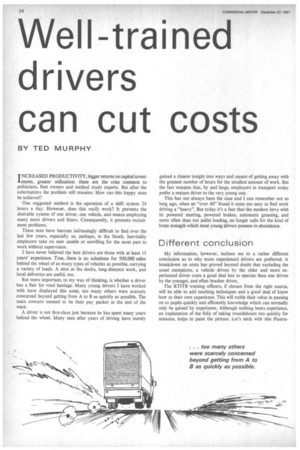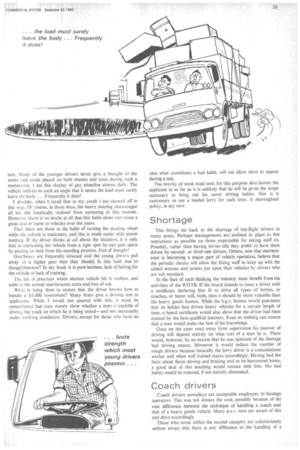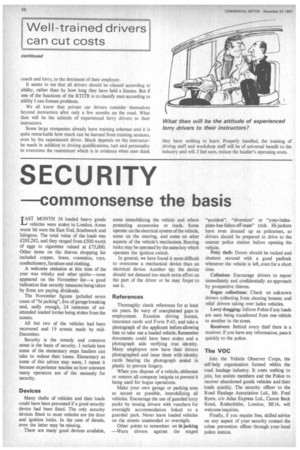Well-trained drivers can cut costs
Page 36

Page 37

Page 38

If you've noticed an error in this article please click here to report it so we can fix it.
BY TED MURPHY
INCREASED PRODUCTIVITY, bigger returns on capital investments,ments, greater utilization: these are the cries common to politicians, fleet owners and method study experts. But after the exhortations the problem still remains: How can this happy state be achieved?
One suggested method is the operation of a shift system 24 hours a day. However, does this really work? It prevents the desirable system of one driver, one vehicle, and means employing many more drivers and fitters. Consequently, it presents recruitment problems.
These men have become inareasingly difficult to find over the last few years, especially so, perhaps, in the South. Inevitably employers take on men unable or unwilling for the most part to work without supervision.
I have never believed the best drivers are those with at least 15 years' experience. True, there is no substitute for 500,000 miles behind the wheel of as many types of vehicles as possible, carrying a variety of loads. A stint at the docks, long-distance work, and local deliveries are useful, too.
But more important, to my way of thinking, is whether a driver has a flair for road haulage. Many young drivers I have worked with have displayed this asset, too many others were scarcely concerned beyond getting from A to B as quickly as possible. The main concern seemed to be their pay packet at the end of the week.
A driver is not first-class just because he has spent many years behind the wheel. Many men after years of driving have merely gained a clearer insight into ways and means of getting away with the greatest number of hours for the smallest amount of work. But the fact remains that, by and large, employers in transport today prefer a mature driver to the very young one.
This has not always been the case and I can remember not so long ago, when an "over 40" found it none too easy to find work driving a "heavy". But today it's a fact that the modern lorry with its powered steering, powered brakes, automatic greasing, and more often than not pallet loading, no longer calls for the kind of brute strength which most young drivers possess in abundance.
Different conclusion
My information, however, inclines me to a rather different conclusion as to why more experienced drivers are preferred. A breakdown on costs has proved beyond doubt that excluding the usual exceptions, a vehicle driven by the older and more experienced driver costs a good deal less to operate than one driven by the younger, and often brasher driver.
The RTITB training officers, if chosen from the right source, will be able to add teaching techniques and a good deal of know how to their own experience. This will treble their value in passing on to pupils quickly and efficiently knowledge which can normally only be gained by experience. Although nothing beats experience, an explanation of the folly of taking roundabouts too quickly for instance, helps to paint the picture. Let's stick with this illustra
tion. Many of the younger drivers never give a thought to the stress and strain placed on both chassis and tyres during such a manoeuvre. I see this display of gay abandon almost daily. The vehicle inclines to such an angle that it seems the load must surely leave the body. ... Frequently it does!
I shudder, when I recall that in my youth I too showed off in this way. Of course, in those days, the heavy steering discouraged all but the fanatically inclined from cornering in this manner. However, there is no doubt at all that this habit alone can cause a great deal of harm to vehicles over the years.
Then there are those in the habit of turning the steering wheel while the vehicle is stationary, and this is made easier with power steering. If the driver thinks at all about the situation, it is only that in extricating his vehicle from a tight spot he can gain space by putting on lock from the standing position. End of thought!
Gearboxes are frequently misused and the young drivers pull away in a higher gear then they should, Is this fault due to thoughtlessness? In my book is is pure laziness, lack of feeling for the vehicle or lack of training.
The list of practices which shorten vehicle life is endless, and adds to the annual maintenance costs and loss of use.
What is being done to ensure that the driver knows how to handle a 6.000 investment? Many firms give a driving test to applicants. While I would not quarrel with this, it must be remembered that tests merely show whether a man is capable of driving the truck on which he is being tested—and not necessarily under working conditions. Drivers, except for those who have no idea what constitutes a bad habit, will not allow them to appear during a test.
The brevity of most road tests for this purpose also favour the applicant in so far as it is unlikely that he will be given the scope necessary to bring out his worst driving habits. Nor is it customary to use a loaded lorry for such tests. A shortsighted policy, in my view.
Shortage
This brings me back to the shortage of top-flight drivers in many areas. Perhaps managements are inclined to place as few restrictions as possible on those responsible for taking staff on. Possibly, rather than having lorries idle they prefer to have them driven by secondor third-rate drivers. Others, now that maintenance is becoming a major part of vehicle operation, believe that the periodic checks will allow the fitting staff to keep up with the added stresses and strains put upon their vehicles by drivers who are sub standard.
In the face of such thinking the industry must benefit from the activities of the RTITB. If the board intends to issue a driver with a certificate declaring him fit to drive all types of lorries, or coaches, or better still, both, then it should be more valuable than the heavy goods licence. While the h.g.v. licence would guarantee that its holder had driven heavy vehicles for a certain length of time, a board certificate would also show that the driver had been trained by the best-qualified teachers. Even so nothing can ensure that a man would make the best of his knowledge.
Once on the open road away from supervision his manner of driving will depend entirely on what sort of a man he is. There would, however, be no excuse that he was ignorant of the damage bad driving causes. Moreover it would reduce the number of rough drivers because basically the lorry driver is a conscientious worker and when well trained reacts accordingly. Having had the facts about fierce driving and braking and so on hammered home, a good deal of this teaching would remain with him. His bad habits would be reduced, if not entirely eliminated.
Coach drivers
Coach drivers nowadays are acceptable employees to haulage operators. This was not always the case, possibly because of the vast difference between the technique of handling a coach and that of a heavy goods vehicle. Many p.s.v. men are aware of this and drive accordingly.
Those who come within the second category are unfortunately seldom aware that there is any difference to the handling of a coach and lorry, to the detriment of their employer.
It seems to me that all drivers should be classed according to ability, rather than by how long they have held a licence. But if one of the functions of the RTITB is to classify men according to ability I can foresee problems.
We all know that private car drivers consider themselves beyond instruction after only a few months on the road. What then will be the attitude of experienced lorry drivers to their instructors.
Some large companies already have training schemes and it is quite remarkable how much can be learned from training sessions, even by the experienced driver. Much depends on the instructor: he needs in addition to driving qualifications, tact and personality to overcome the resentment which is in evidence when men think
they have nothing to learn. Properly handled, the training of driving staff and workshop staff will be of universal benefit to the industry and will, I feel sure, reduce the haulier's operating costs.




















































































